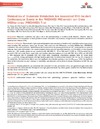Identificador persistente para citar o vincular este elemento:
https://accedacris.ulpgc.es/jspui/handle/10553/42449
| Título: | Metabolites of glutamate metabolism are associated with incident cardiovascular events in the PREDIMED PREvención con DIeta MEDiterránea (PREDIMED) Trial | Autores/as: | Zheng, Yan Hu, Frank B. Ruiz-Canela, Miguel Clish, Clary B. Dennis, Courtney Salas-Salvado, Jordi Hruby, Adela Liang, Liming Toledo, Estefania Corella, Dolores Ros, Emilio Fitó, Montserrat Gómez-Gracia, Enrique Arós, Fernando Fiol, Miquel Lapetra, José Serra Majem, Luis Estruch, Ramón Martínez-González, Miguel A. |
Clasificación UNESCO: | 3206 Ciencias de la nutrición | Palabras clave: | Cardiovascular disease Diet Dietary clinical trial Epidemiology Glutamate, et al. |
Fecha de publicación: | 2016 | Publicación seriada: | Journal of the American Heart Association | Resumen: | Background: Glutamate metabolism may play a role in the pathophysiology of cardiometabolic disorders. However, there is limited evidence of an association between glutamate-related metabolites and, moreover, changes in these metabolites, and risk of cardiovascular disease (CVD). Methods and Results: Plasma levels of glutamate and glutamine were measured at baseline and 1-year follow-up in a case-cohort study including 980 participants (mean age 68 years; 46% male) from the PREvención con DIeta MEDiterránea (PREDIMED) randomized trial, which assessed a Mediterranean diet intervention in the primary prevention of CVD. During median 4.8 years of follow-up, there were 229 incident CVD events (nonfatal stroke, nonfatal myocardial infarction, or CVD death). In fully adjusted models, per 1-SD, baseline glutamate was associated with 43% (95% CI: 16% to 76%) and 81% (39% to 137%) increased risk of composite CVD and stroke alone, respectively, and baseline glutamine-to-glutamate ratio with 25% (6% to 40%) and 44% (25% to 58%) decreased risk of composite CVD and stroke alone, respectively. Associations appeared linear for stroke (both Plinear trend≤0.005). Among participants with high baseline glutamate, the interventions lowered CVD risk by 37% compared to the control diet; the intervention effects were not significant when baseline glutamate was low (Pinteraction=0.02). No significant effect of the intervention on year-1 changes in metabolites was observed, and no effect of changes themselves on CVD risk was apparent. Conclusions: Baseline glutamate was associated with increased CVD risk, particularly stroke, and glutamine-to-glutamate ratio was associated with decreased risk. Participants with high glutamate levels may obtain greater benefits from the Mediterranean diet than those with low levels. Clinical Trial Registration: URL: www.controlled-trials.com. Unique identifier: ISRCTN 35739639. | URI: | https://accedacris.ulpgc.es/handle/10553/42449 | ISSN: | 2047-9980 | DOI: | 10.1161/JAHA.116.003755 | Fuente: | Journal of the American Heart Association [ISSN 2047-9980], v. 5 (9) |
| Colección: | Artículos |
Citas SCOPUSTM
87
actualizado el 08-jun-2025
Citas de WEB OF SCIENCETM
Citations
79
actualizado el 22-feb-2026
Visitas
156
actualizado el 01-nov-2024
Descargas
115
actualizado el 01-nov-2024
Google ScholarTM
Verifica
Altmetric
Comparte
Exporta metadatos
Los elementos en ULPGC accedaCRIS están protegidos por derechos de autor con todos los derechos reservados, a menos que se indique lo contrario.
